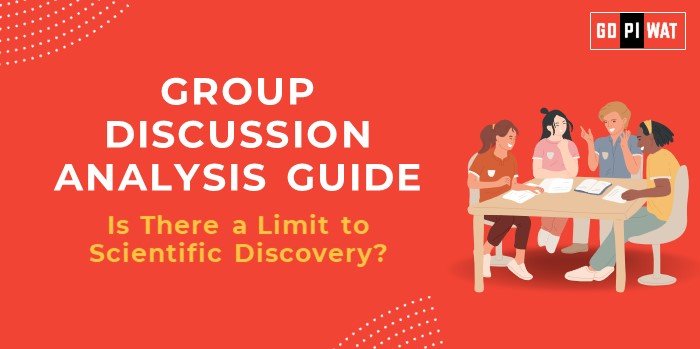📋 Group Discussion Analysis Guide: Is There a Limit to Scientific Discovery?
🌐 Introduction to the Topic
Opening Context: The boundaries of scientific discovery touch on fundamental questions about human potential, technological progress, and ethical responsibility. In an era of rapid technological advancements, from artificial intelligence to genetic engineering, the debate over the limits of scientific knowledge is more relevant than ever.
Background: The question of scientific limits invites exploration of practical, theoretical, and ethical boundaries. While technology has extended our capacity for discovery, some argue that certain truths may forever remain beyond human reach due to cognitive or ethical constraints.
📊 Quick Facts and Key Statistics
- 🪐 Atoms in the Observable Universe: Estimated at ~1080, underscoring the vast scale of the universe and the challenges in fully understanding it.
- 🧬 Human Genome Sequencing: Completed in 2003, revealing 20,000-25,000 genes and unlocking new possibilities in personalized medicine.
- 💸 Global R&D Expenditure: Surpassed $2.4 trillion in 2023, showing the scale of investment in scientific advancement.
- 📈 Doubling Time for Knowledge: Approximately every 13 months, reflecting the exponential growth of information due to digitalization and AI.
🎭 Stakeholders and Their Roles
- 🏛️ Governmental Agencies: Invest in research for areas like climate change, health, and space, setting ethical and practical guidelines.
- 🏫 Scientific Institutions and Universities: Lead foundational research, fostering breakthroughs across fields and training future scientists.
- 💼 Private Sector and Tech Companies: Drive innovation in AI, biotech, and materials science, often focusing on applications with market potential.
- 🧑🤝🧑 Civil Society: Engages in ethical discussions, funding choices, and shaping policies around scientific advancement.
🏆 Achievements and Challenges
✨ Achievements
- 🚀 Space Exploration: Missions to Mars, the Moon, and beyond continue to expand our understanding of the universe.
- 🧬 Genomics: The completion of the Human Genome Project opened new frontiers in medical and genetic research.
- 🤖 AI in Scientific Discovery: Tools like AlphaFold have solved problems previously beyond human computation, such as protein folding, paving the way for breakthroughs in drug discovery.
- ⚛️ Physics Breakthroughs: Discoveries like the Higgs boson have validated core theories, furthering our grasp of the fundamental forces of nature.
⚠️ Challenges
- ⚖️ Ethical Boundaries: Controversies around gene editing and artificial intelligence highlight the moral responsibilities tied to certain scientific advances.
- 💰 Financial and Technological Constraints: High costs restrict areas such as particle physics, where only a few countries can fund high-energy experiments.
- 🧠 Cognitive Limits: Some argue that the complexity of certain phenomena, like consciousness or quantum mechanics, may inherently limit our understanding.
🌍 Global Comparisons
- 🇺🇸 U.S. and Europe: Leading in AI and biomedical research but facing ethical and regulatory challenges around privacy and AI autonomy.
- 🇨🇳 China: Accelerating innovation in AI, quantum computing, and space, often with fewer regulatory constraints.
🔬 Case Studies
CRISPR and Gene Editing: The revolutionary technology allowing for precise DNA editing raises ethical questions about potential misuse and unforeseen consequences.
📚 Structured Arguments for Discussion
- Supporting Stance: “The rapid progress of technology demonstrates that science has no inherent boundaries; each discovery only opens new paths for exploration.”
- Opposing Stance: “Certain truths, like the nature of consciousness or the universe’s ultimate origin, may remain forever beyond human understanding due to cognitive and ethical limits.”
- Balanced Perspective: “While scientific advancement has been exponential, some challenges may prove insurmountable due to ethical, practical, or inherent limitations. Yet, technology may push some boundaries further than we imagine today.”
🗣️ Effective Discussion Approaches
- Opening Approaches:
- ⏳ Historical Comparison: “Centuries ago, the concept of splitting the atom seemed impossible. What limits might today’s unknowns reveal in the future?”
- 🔬 Technological Impact: “AlphaFold’s solution to protein folding underscores how AI is expanding scientific boundaries beyond human computation.”
- ⚖️ Ethical Dilemma: “As genetic engineering becomes possible, questions arise about where science should stop. Should we edit human genes indefinitely?”
- Counter-Argument Handling:
- For cognitive limits: Acknowledge human limitations but highlight AI’s potential to augment understanding.
- For ethical concerns: Recognize valid fears but suggest solutions like regulatory bodies to ensure responsible exploration.
📊 Strategic Analysis of Strengths and Weaknesses
Strengths:
- ⚡ Technological innovations continue to advance, often faster than ethical guidelines can adapt.
- 🧠 AI enables exploration of complex data that would be insurmountable for human analysis alone.
Weaknesses:
- 💰 High financial and resource costs for breakthroughs.
- 🧩 Human cognitive limits, especially with concepts like infinity, consciousness, and quantum mechanics.
Opportunities:
- 🤝 Increased international collaboration for joint problem-solving on large-scale scientific questions.
- 🤖 Advances in AI may allow humans to understand phenomena previously out of reach.
Threats:
- ⚠️ Potential ethical abuses in fields like genetic modification.
- 😟 Public mistrust of scientific institutions if ethical boundaries are not respected.
🏫 Connecting with B-School Applications
Real-World Applications: Business applications in biotech, healthcare, and AI, with insights into how ethical boundaries shape industry practices.
Sample Interview Questions:
- 💭 “What role should ethics play in determining the limits of scientific discovery?”
- 🤝 “How can business and science collaborate responsibly?”
Insights for B-School Students: Understanding the intersection of technology, ethics, and innovation prepares students to navigate industries shaped by scientific advancements.


